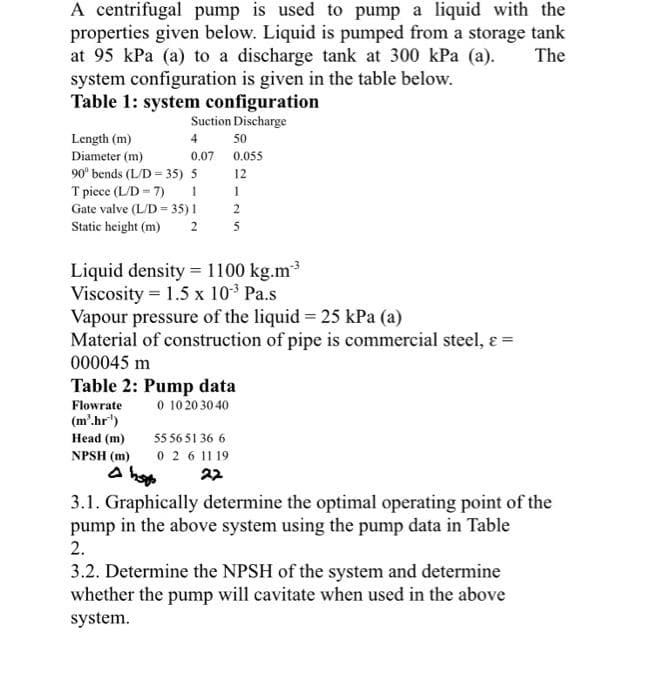A centrifugal pump is used to pump a liquid with the properties given below. Liquid is pumped from a storage tank at 95 kPa (a) to a discharge tank at 300 kPa (a). The system configuration is given in the table below. Table 1: system configuration Suction Discharge 4 50 Length (m) Diameter (m) 0.07 0.055 12 90° bends (L/D-35) 5 T piece (L/D-7) 1 1 Gate valve (L/D=35) 1 2 Static height (m) 25 Liquid density = 1100 kg.m³ Viscosity = 1.5 x 10³ Pa.s Vapour pressure of the liquid = 25 kPa (a) Material of construction of pipe is commercial steel, ε = 000045 m Table 2: Pump data Flowrate 0 10 20 30 40 (m³.hr¹) Head (m) 55 56 51 36 6 0 2 6 11 19 NPSH (m) Ahsto 3.1. Graphically determine the optimal operating point of the pump in the above system using the pump data in Table 2. 3.2. Determine the NPSH of the system and determine whether the pump will cavitate when used in the above system.
A centrifugal pump is used to pump a liquid with the properties given below. Liquid is pumped from a storage tank at 95 kPa (a) to a discharge tank at 300 kPa (a). The system configuration is given in the table below. Table 1: system configuration Suction Discharge 4 50 Length (m) Diameter (m) 0.07 0.055 12 90° bends (L/D-35) 5 T piece (L/D-7) 1 1 Gate valve (L/D=35) 1 2 Static height (m) 25 Liquid density = 1100 kg.m³ Viscosity = 1.5 x 10³ Pa.s Vapour pressure of the liquid = 25 kPa (a) Material of construction of pipe is commercial steel, ε = 000045 m Table 2: Pump data Flowrate 0 10 20 30 40 (m³.hr¹) Head (m) 55 56 51 36 6 0 2 6 11 19 NPSH (m) Ahsto 3.1. Graphically determine the optimal operating point of the pump in the above system using the pump data in Table 2. 3.2. Determine the NPSH of the system and determine whether the pump will cavitate when used in the above system.
Principles of Heat Transfer (Activate Learning with these NEW titles from Engineering!)
8th Edition
ISBN:9781305387102
Author:Kreith, Frank; Manglik, Raj M.
Publisher:Kreith, Frank; Manglik, Raj M.
Chapter10: Heat Exchangers
Section: Chapter Questions
Problem 10.19P
Related questions
Question
100%

Transcribed Image Text:A centrifugal pump is used to pump a liquid with the
properties given below. Liquid is pumped from a storage tank
at 95 kPa (a) to a discharge tank at 300 kPa (a). The
system configuration is given in the table below.
Table 1: system configuration
Suction Discharge
4
50
Length (m)
Diameter (m)
0.07
0.055
12
90° bends (L/D-35) 5
T piece (L/D=7)
Gate valve (L/D-35) 1
1
1
2
Static height (m) 25
Liquid density = 1100 kg.m³
Viscosity = 1.5 x 10-³ Pa.s
Vapour pressure of the liquid = 25 kPa (a)
Material of construction of pipe is commercial steel, ε =
000045 m
Table 2: Pump data
0 10 20 30 40
Flowrate
(m³.hr¹)
Head (m)
55 56 51 36 6
NPSH (m)
0 2 6 11 19
22
3.1. Graphically determine the optimal operating point of the
pump in the above system using the pump data in Table
2.
3.2. Determine the NPSH of the system and determine
whether the pump will cavitate when used in the above
system.
Expert Solution
This question has been solved!
Explore an expertly crafted, step-by-step solution for a thorough understanding of key concepts.
Step by step
Solved in 2 steps with 5 images

Knowledge Booster
Learn more about
Need a deep-dive on the concept behind this application? Look no further. Learn more about this topic, mechanical-engineering and related others by exploring similar questions and additional content below.Recommended textbooks for you

Principles of Heat Transfer (Activate Learning wi…
Mechanical Engineering
ISBN:
9781305387102
Author:
Kreith, Frank; Manglik, Raj M.
Publisher:
Cengage Learning

Automotive Technology: A Systems Approach (MindTa…
Mechanical Engineering
ISBN:
9781133612315
Author:
Jack Erjavec, Rob Thompson
Publisher:
Cengage Learning

Principles of Heat Transfer (Activate Learning wi…
Mechanical Engineering
ISBN:
9781305387102
Author:
Kreith, Frank; Manglik, Raj M.
Publisher:
Cengage Learning

Automotive Technology: A Systems Approach (MindTa…
Mechanical Engineering
ISBN:
9781133612315
Author:
Jack Erjavec, Rob Thompson
Publisher:
Cengage Learning